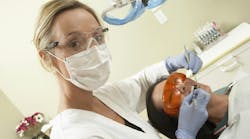When you go in for your periodic dental exam, do you know the qualifications of your clinician? Are you seeing a dental hygienist, a dentist, or an assistant for your cleaning? And what's the difference between the three?
Many offices are struggling to find the staff they need-including a qualified registered dental hygienist (RDH). 49.7% of dentists responding report they have taken on more hygienist, assistant, or admin duties in the past few years. Seventy-seven percent of those respondents noted that it's been "extremely challenging" to recruit dental hygienists.1 So, offices might be getting creative when it comes to getting you in for your preventive maintenance visit.
Hygiene education
I often joke that I went to college to learn how to floss, but dental hygiene education involves far more than just knowing how to properly clean teeth. In fact, I think cleaning is the least important thing we do. From performing head and neck cancer exams, airway assessments, periodontal evaluations, cavity detections, nutrition discussions, and home care education, dental hygienists are prevention specialists and have thus saved lives with these examinations.
Finding appointment time
Unfortunately, many offices are in a tight spot when it comes to finding open appointment times for patients in need. Some offices are shortening appointments or delegating duties to other team members. Dentists are "cleaning teeth," hygienists are hopping from chair to chair, and assistants are taking on extra tasks.
Amid the staffing shortage, it's crucial that none of the important routine examinations are skipped during appointments. When an office shaves 10 minutes off an appointment time, what at should they leave out? Or if they just "go faster," will they see that cancerous growth on someone's tonsils?
Attempts to change legislation
A few states have attempted to change legislation around duties once reserved for dental hygienists. Assistants are now sometimes offered a weekend course in scaling teeth, which bypasses years of necessary education. While I've worked with some amazing, well-trained, and educated assistants who are fully capable of learning this expanded duty, many assistants have no formal education at all.
In fact, I started my dental career at age 15 when my local pediatric dentist hired me to be a dental assistant, and I had no prior training. Thankfully, he employed RDHs to perform the prevention visits, so I was tasked with handing him instruments and cleaning rooms. But in my state, assistants are often assigned pediatric patients, polishing their teeth and skipping vital assessments during their appointments.
There's even a push to follow a model used in Alabama to eliminate formal dental hygiene education altogether and have dentists train clinicians to be hygienists. As we are coming to understand how the health of your mouth directly impacts the health of your body, now is not the time to lessen the education hygienists receive.
What you might be missing without dental hygiene license
I could only perform those assessments after taking courses that laid a foundational understanding in chemistry, anatomy, pharmacology, microbiology, and more. Hygienists spent hours learning head and neck anatomy so that we could identify what's normal and abnormal. We know the specific shapes of each tooth's root structure. Think about it-when that sharp instrument is below your gums, we need to know the nooks and crannies of each tooth since we can't see them!
Think of your mouth like your car. If you went in for an oil change and a full inspection, and all you got was a quick look under the hood and a car wash, would you be OK with that?
What to look for
The Commission on Dental Accreditation (CODA) is the governing body that monitors and accredits dental programs. CODA requires 2,932 hours of education to be appropriately and safely trained before applying to be an RDH. Hygienists must pass national and state boards and complete mandatory continuing education to earn and maintain the title of registered dental hygienist—they might also have a bachelor's degree or even a PhD.
It might be worth asking about your clinician's credentials before your next appointment to ensure you're getting the best preventive care possible. And at your appointment, be sure to find out what new things they've learned at their latest continuing education course!
Reference:
-
Leaver SE. More dentists taking on hygiene, admin duties. Dentistry IQ. November 16, 2023. https://www.dentistryiq.com/home/article/14301630/more-dentists-taking-on-hygiene-admin-duties








